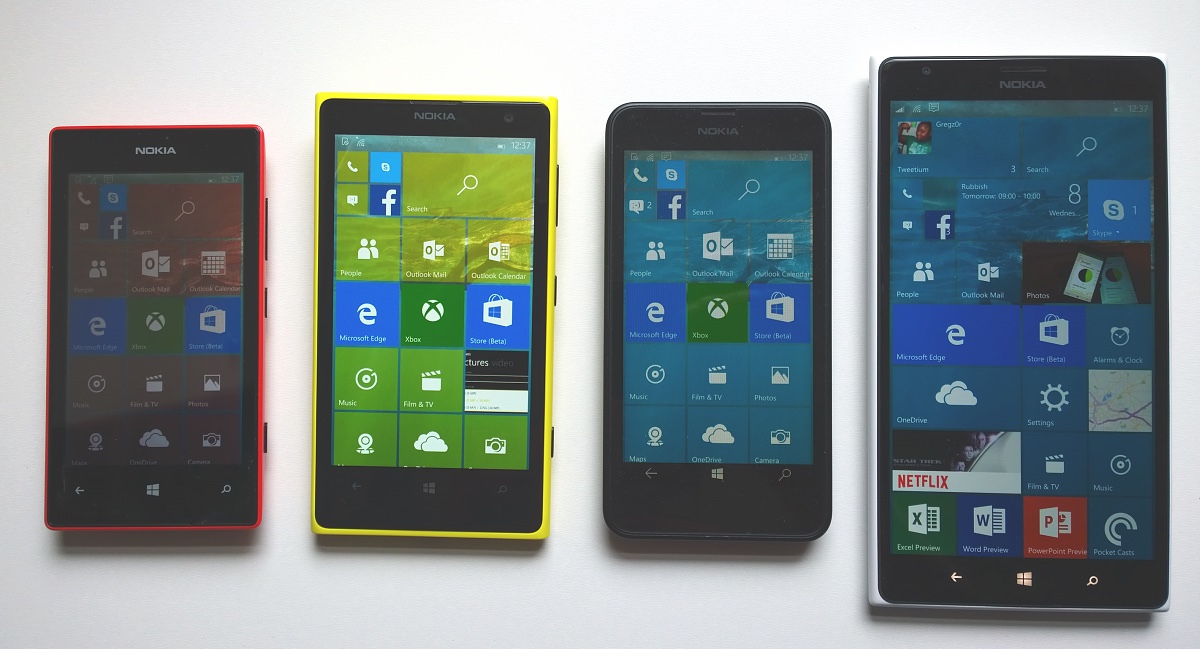I first noticed this optimisation for Snapdragon x00 series chipsets back in September 2014, when looking at Skype on Windows Phone, but the same tweaking has been true for many other Windows Phone components since then.
With that in mind, I've added two (one bottom end, one top end) S4-based Lumias into my real world benchmarks. I'd already established in the games arena that the top end S4s performed roughly equal to the mid range Snapdragon 400 on Windows Phone, but looking at general tasks that every user will want to accomplish under Windows 10 Mobile was something entirely different.

From left to right, the S4-based Lumia 520 and 1020, then the Snapdragon 400-based Lumia 630 and the Snapdragon 800-based Lumia 1520
In each case, I've made sure that each phone is in the same state (i.e. hard reset, minimal installs, with no extra account-specific, or state-specific overheads). In most cases, I opened the appropriate screen or app and then backed out and went in again, just to make sure there were no extra 'first time' delays.
Here are the results, and noting that I've done everything I can to reduce the width of the table, for easier mobile access(!):
| Windows 10 Mobile Build 10149 (All times in seconds) |
Lumia 520 | Lumia 1020 | Lumia 630 | Lumia 1520 |
| Specs | 512MB RAM dual core MSM8227± 1GHz |
2GB RAM dual core MSM8960± 1.5GHz |
512MB RAM quad core Snapdragon 400 1.2GHz |
2GB RAM quad core Snapdragon 800 2.2GHz |
| Booting up to the Start screen | 73 | 39 | 35 | 34 |
| Loading up the full version of the New York Times web site in Edge |
19 | 17 | 18 | 12 |
| Opening up the Windows 10 Store (beta) |
16 | 7 | 10 | 8 |
| Opening up Skype, pre-signed in | 13 | 7 | 9 | 7 |
| Opening up MSN News | 14 | 8 | 7 | 8 |
| Opening up a Facebook 'Photos' page |
5 | 4 | 3 | 3 |
| Opening up Cortana, waiting for weather and headlines to appear |
4 | n/a** | 2 | 2 |
| Launching Lumia Camera Classic | 8 | 5 | 4 | 2* |
| Finding the weather for a new city (in MSN Weather) |
4 | 3 | 2 | 3 |
| Opening a new Excel spreadsheet from a template |
10 | 4 | 4 | 3 |
* though less than a second for Lumia Camera v5.x, interestingly
** despite being set to English (UK) throughout, our test 1020 kept coming up with 'Cortana not available in your country'!
± both these two phones are classed as 'Snapdragon S4 Plus', but this family includes several variants. The two here are very different in overall capability
Unlike with my RAM observations, Windows 10 Mobile is currently struggling on the slower Snapdragon S4 processors, in terms of experience. Admittedly there may well be some tuning yet to happen as Windows 10 Mobile gets prepared for release, but at the moment I'd say that the popular Lumia 520 (and other 1.0GHz S4-based devices) run too slowly to be compared favourably to the existing Windows Phone 8.1.
On the 1.5GHz Lumia 1020, that extra 50% on both cores makes a big difference and UI timings were comparable to those of the more modern chipset smartphones. Which is good to see - and remember that I've already covered what to expect and what not to expect from the 1020's camera under Windows 10 Mobile.
Of course, leaving aside that extra optimisations in the next few months may improve things on the Lumia 520 (et al), as debug code is removed and everything tightened up, there's another factor at play - the target user what they expect from their smartphone. The Lumia 520 sold in relatively large numbers but to the uninitiated, who have no real frame of reference as to what sort of performance to expect, at least not for that price. Having picked up the 520 on pay as you go for (in the UK) less than £80, discovering that Facebook takes 5 seconds to up a specific pane or that it takes 13 seconds to crank Skype into action for the first time after powering on, aren't necessarily going to be showstopping issues. There's a corollary here too, mind you, in that such a user may not see a compelling reason to upgrade to Windows 10 Mobile in the first place. Remember that 'normobs' just want a phone that works and, down at this end of the spectrum, I often see users with loads of updates waiting, sometimes security-related, yet un-applied!
My testing of the MSM8960-equipped Lumia 1020 gives me hope though - and should also to the legions of Lumia 920 and 925 owners, all of whom will see performance only slightly slower than people on much newer x00-equipped smartphones.
Overall, all of the devices above were slower in almost everything than the same phones under Windows Phone 8.1 Update 1, but then that's an unfair comparison at the moment - I'll be revisiting absolute performance once Windows 10 Mobile is officially optimised, tweaked, fixed and released - in the Autumn.
